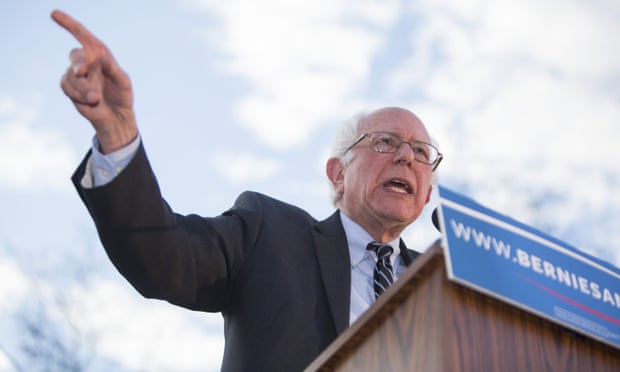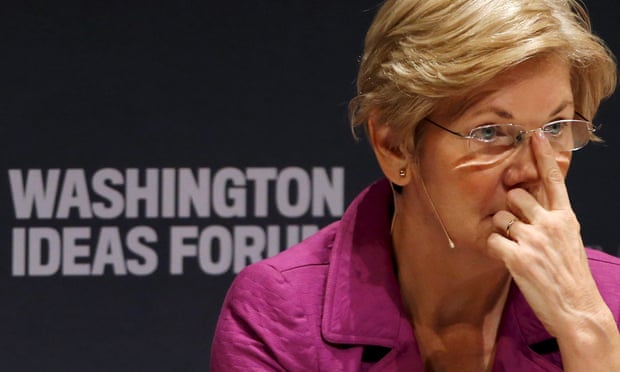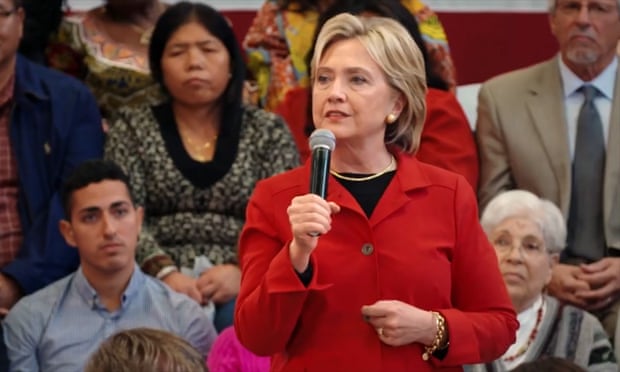Leading architects of the “New Democrat” movement are sounding the alarm over a lurch to the left in the party, after candidates at the latest presidential primary debate confirmed a resurgence of more populist economic policies.
Hillary Clinton, Bernie Sanders and Martin O’Malley spoke passionately about the need to reduce wage inequality and corporate power during a forum in South Carolina on Friday night in which all three distanced themselves from the establishment orthodoxy that has long prevailed in Washington.
It followed a similar performance from Clinton at the first official debate in Las Vegas last month that restored her lead over Sanders – who describes himself as a democratic socialist – but has nonetheless left the party with one of its most radical policy platforms in decades.
“We’re at a point in history right now where both our democracy and our economy are not working for the majority,” the former secretary of state told MSNBC moderator Rachel Maddow at the South Carolina event.
“People rightly believe that corporations and the powerful have stacked the deck in their favour and against everybody else.”
How committed Clinton is to her new anti-establishment agenda remains a matter of fierce debate, not least among Sanders supporters, but Guardian interviews with leading activists on both sides of the party’s divide suggest the lurch to the left is not limited to presidential politics.
“The battle for the soul of the Democratic party is coming to an end,” claims Adam Green, co-founder of the Progressive Change Campaign Committee (PCCC), a champion of Massachusetts senator Elizabeth Warren.
“It’s not just Sanders and O’Malley, there is an entire Warren wing of American politics that includes certain politicians, thinktank, and advocacy groups [and] has fundamentally shifted the national debate in an economic populist direction.”
They point to near-universal rejection among Democrats of Barack Obama’s free trade agreement, a lasting revolt against his plans to cut social security andradical promises to curb student debt as signs that the Democratic mainstream has outstripped a progressive president who once seemed too radical for his party.
Yet signs are growing of a backlash within what remains of the party’s more business-friendly and economically conservative New Democrat wing.
At Columbia University in New York this weekend the Progressive Policy Institute, which helped Bill Clinton and Tony Blair pioneer so-called third way politics in the 1990s, held a closed-door strategy session for congressional staffers that was designed to find ways of promoting growth.
“There is no question that the prevailing temper of the Democratic party is populist: strongly sceptical of what we like to call capitalism and angry about the perceived power of the monied elite in politics,” says PPI president and founder Will Marshall.
“But inequality is not the biggest problem we face: it is symptomatic of the biggest problem we face, which is slow growth.”
Al From, a leading figure of the centre left who chaired the Democratic Leadership Council during the first Clinton presidency, argues that a focus on inequality, though understandable after the banking crash, risks driving all candidates too far from policies that would promote growth.
“They rev up the base of the party, but if all you are doing is redistributing golden eggs and you’ve got a dead goose, you aren’t going to get very far,” he says. “That’s what I worry about more than anything else.”
He adds: “It’s feelgood politics. It’s very easy to say, ‘When I’m elected we are going to increase social security’, but we might not be able to pay for social security as it is.”
The Wisconsin congressman Ron Kind, who chairs the New Democrat Coalition in Congress, even compares some progressives in the House of Representatives to the Tea Party movement among Republicans: a sign that redistricting of once tightly-contested seats has left American politics “way too polarised, way too partisan, and way too much about playing to niche interests”.
But despite PPI’s Columbia summit and a burst of recent policy papers from another centrist group, Third Way, the influence of the New Democrat Coalition and a similar grouping of moderate southern Democrats known as the Blue Dogs is widely seen as in terminal decline.
All three moderates who spoke to the Guardian ahead of the South Carolina forum acknowledge that the US has changed dramatically since the 1990s, when the New Democrat movement was born as an answer to three heavy defeats to Republicans under Ronald Reagan and George HW Bush.
“Culturally, the country has progressed a lot and we are not going back,” says From, who points especially to changing attitudes to gay marriage and women’s rights. “But the question is whether a major political party can sustain itself solely on cultural issues and can have a real shot at governing, if it doesn’t have a growth agenda as part of its programme.”
Unsurprisingly, their view is not shared among those pushing the party to the left, who dispute the claim that it reduces the chances of ever taking back control of Congress as well as the White House.
They argue the reverse: that economic populism is a way for Democratsto transcend culture wars that have divided the country and find common cause with Republicans who are equally fed up with stagnant middle class wages and the power of the Wall Street elite.
“These are sound general election strategies, not just primary strategies … especially in red states, and especially in purple states, where if we want to overcome cultural divide issues we need to lean more into economic populist issues,” says Green at the PCCC.
“If [voters] are thinking about debt-free college and social security benefits, then we win. In some states, if they are thinking about guns and immigration, then we lose.”
Green and Neil Sroka of the grassroots group Democracy for America also revealed how a key gathering of activists in California in 2013 laid the groundwork for the transformation now reverberating through the party.
The meeting in a San Jose hotel room of groups also including MoveOn.org,Working Families, Progressives United and Social Security Works was an informal spin off from the annual Netroots Nation conference. Attendees dressed in shorts and T-Shirts.
But despite the laid-back vibe, the meeting was an angry reaction to Obama’s recent proposal to cut social security, something the White House saw as a necessary concession to encourage Republicans to compromise on other budget issues.
Having successfully fought their own president and defended the pension rights of millions of Americans, the activists decided to go on the offensive and try to convince other Democrats to begin talking about expanding social security instead.
“We treated it like a product launch,” explains Green, who describes how they latched on to a bipartisan bill in Congress and eventually persuaded almost every Senate Democrat and presidential candidate to consider expanding this key federal entitlement programme.
A similar orchestrated push lay behind the decision by Clinton, Sanders and O’Malley to back radical reform of college funding.
This time Senator Warren worked with New York moderate Chuck Schumer tosponsor a bill proposing to eliminate student debt for poorer students in public colleges – something later taken up in some form by all the party’s would-be nominees for the 2016 election.
“The entire time, the main objective was to get presidential candidates to feel comfortable,” Green says.
“This isn’t just an election year reality,” Sroka adds. “These issues are things progressives have been talking about for the better part of two or three years.”
Of course, such lobbying is only part of the explanation but the well-funded and well-organised groups behind it are attracting envy from rivals.
“What they have built is a progressive infrastructure to counter the power of right wing media,” claims PPI’s Marshall. “And they have succeeded, so now we have a left wing echo chamber that is at least as well funded and robust as the right wing.
“It is big, pervasive and well-funded, so you have a lot of the energy on the extremes of American politics propelled by anger.
The response from those inside the supposed leftwing echo chamber is actually more one of hollow laughter as they point how much groups such as Third Way are backed by Wall Street and how 80% of the money for groups such as DFA comes from individuals giving $200 or less.
Nonetheless, it is far from the biggest source of disagreement between the two wings of the party. That prize goes to Hillary Clinton, whose long-term commitment to the radical cause remains a matter of heated dispute.
On Friday, Clinton was barely distinguishable from Sanders and O’Malley – even denying her hawkish foreign policy reputation by insisting she would be no “more aggressive” a commander-in-chief than Obama.
But many moderates believe she will come around once the primary contest is over, particularly over trade when her opposition to Obama’s Trans Pacific Partnership (TPP) deal is the biggest thorn in the side of pro-business Democrats.
“I’d lie if I said I wasn’t disappointed with the statement that she made on TPP,” says representative Kind. “Everyone knew where she was on that and where she will be, but given the necessities of the moment and a tough Democratic primary she felt she needed to go there initially.”
From agreed. “Hillary will bend a little bit but not so much that she can’t get herself back on course in the general [election] and when she is governing,” he said.
Yet others on both right and left believe Clinton may have gone too far to turn back.
“The danger is that she and other Democrats may believe that there is no political risk in appeasing core partisans with an ideological message,” warns Marshall.
Others caution against writing off the challenge from Sanders just yet, but agree that Clinton cannot easily walk away from her stand against inequality just because he is beaten.
“I think the idea that this primary is over is overblown,” Sroka says. “But you also need to recruit and gain the allegiance of the grassroots base of the party to win the general and you can’t do that by taking one position now and changing it later.”
Paradoxically, some New Democrats may even relish a Sanders resurgence, pointing to the similar experience of Ed Miliband and Jeremy Corbyn in the British Labour party, which they claim will ultimately prove the folly of pandering to the left.
“If we are going to be a governing party we have to [focus more on economic growth], but there is not going to be any pressure in the presidential process until we lose an election or two,” concludes From.
“I think we are in for a long period of the Republicans dominating Congress and state legislatures and the Democrats holding the presidency.”



0 comments:
Post a Comment